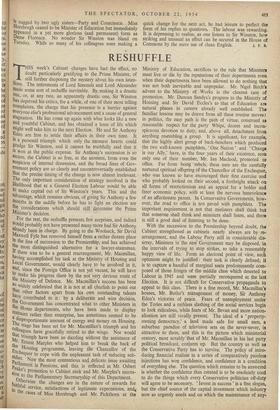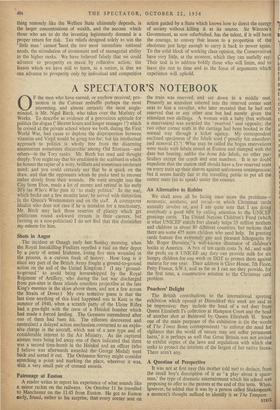RESHUFFLE
HIS week's Cabinet changes have had the effect, no doubt particularly gratifying to the Prime Minister, of still further deepening the mystery about his own inten- tions. The retirements of Lord Simonds and Lord Alexander Made some sort of reshuffle inevitable. By making it a drastic One, or, at any rate, an apparently drastic one, Sir Winston has deprived his critics, for a while, of one of their most telling complaints, the charge that his presence is a barrier against everyone else's professional advancement and a cause of general stagnation. He has come up again with what looks like a new and youthful Cabinet, and has obtained a lease of life which alight well take him to the next Election. He and Sir Anthony Eden are free to "settle their affairs in their own time. It is a personal triumph which only the meanest hearts could grudge Sir Winston, and it cannot be truthfully said that it is Won at the public expense. Sir Anthony's succession is so secure, the Cabinet is so free, at the moment, from even the Suspicion of internal dissension, and the broad lines of Gov- eminent policy are so clearly and uncontroversially established that the precise timing of the change is now almost irrelevant. The only important consideration of strategy involved is the likelihood that at a General Election Labour would be able M make capital out of Sir Winston's years. This and the *advantage, which remains obvious, of giving Sir Anthony a few Months in the saddle before he has to fight an election are the considerations which should still determine the Prime Minister's decision.
For the rest, the reshuffle presents few surprises, and indeed Would probably not have presented many more had Sir Anthony already been in charge. By going to the Woolsack, Sir David Maxwell Fyfe has removed himself from a rather distant place in the line of succession to the Premiership, and has achieved the most distinguished alternative for a lawyer-statesman. If there was to be a general rearrangement, Mr. Macmillan, !laving accomplished his task at the Ministry of Housing and Local Government, would clearly have to be involved in it, and, since the Foreign Office is not yet vacant, he will have to make his progress there by the not very devious route of the Ministry of Defence. Mr. Macmillan's success has been 80 widely celebrated that it is not at all churlish to point out iat other factors apart from his own outstanding talents have contributed to it : by a deliberate and wise decision, We Government has concentrated what to other Ministers in the Home departments, who have been made to display res. traint rather than enterprise, has sometimes seemed to be _a disproportionate amount of energy and money on Housing. The stage has been set for Mr. Macmillan's triumph and his colleagues have gracefully retired to the wings. Nor would ;flat triumph have been so dazzling without the assistance of n Ernest Marples who helped him to break the back of ale Housing programme, leaving the Chancellor of the Exchequer to cope with the unpleasant task .of reducing sub- !idles. Now the most contentious and delicate, issue awaiting _Parliament is Pensions, and this is reflected in Mr. Osbert 11:.eake's promotion to Cabinet rank and Mr. Marples's succes- sion to the Parliamentary Secretaryship of this Department. .a. Otherwise the changes are in the nature of rewards for ithful service, satisfactions of legitimate expectations, and m the cases of Miss Horsbrugh and Mr. Pickthorn at the Ministry of Education, sacrifices to the rule that Ministers must live or die by the reputations of their departments even when their departments have been allowed to do nothing that was not both inevitable and unpopular. Mr. Nigel Birch's advent to the Ministry of Works is the clearest case of promotion. Mr. Duncan Sandys's progress to the Ministiy of Housing and Sir David Eccles's to that of Education are natural phases in careers already well established. The familiar lessons may be drawn from all these routine moves: in politics, the easy path is the path of virtue, construed as reasonable respect for the party Whips, decent and incon- spicuous devotion to duty, and, above all, detachment from anything resembling a group. It is significant, for example, that the highly alert group of back-benchers which produced the two well-known pamphlets, One Nation ' and Change is our Ally.' have, in the four years of their existence, seen only one of their number, Mr. Ian Macleod, 'promoted to office. Far from being rebels, these men are the carefully nurtured spiritual offspring of the Chancellor of the Exchequer, who was known to have encouraged their first exercise and who probably looked on their second, a forthright attack on all forms of restrictionism and an appeal for a bolder and freer economic policy, with at least the nervous benevolence of an affectionate parent. In Conservative Governments, how- ever, the road to office is not paved with pamphlets. The important requirement is not that ministers shall think but that someone shall think and ministers shall listen, and there is still a good deal of listening to be done.
With the succession to the Premiership beyond doubt, the Cabinet strengthened as cabinets nearly always are by re- arrangement, and the Labour Party still in considerable dis- array, Ministers in the new Government may be disposed, in the intervals of trying to stop strikes, to take a reasonably happy view of life. From an electoral point of view, such optimism might be justified : their task is clearly defined; it is to capture a handful of marginal seats predominantly com- posed of those fringes of the middle class which deserted to Labour in 1945 and were partially reconquered at the last Election. It is not difficult for Conservative propaganda to appeal to this class. There is a fine record, Mr. Macmillan's houses, Mr. Butler's management of money, Sir Anthony Eden's victories of peace. Fears of unemployment under the Tories and a ruthless slashing of the social services begin to look ridiculous, while fears of Mr. Bevan and more nation- alisation are still vividly present. The ideal of a property- owning democracy,' a land made safe for small men, a suburban paradise of television sets on the never-never, is attractive to them, and this is the picture which ministerial oratory, most notably-that of Mr. Macmillan in his last party political broadcast, conjures up. But the country as well as the Conservative Party has to survive. The policy of intro- ducing financial realism in a series of comparatively painless injections has woe confidence, and confidence is a condition of everything else. The question which remains to be answered is whether the confidence thus created is to be resolutely used to do the things which every Conservative politician off-duty will agree to be necessary. ' Invest in success ' is a fine slogan, but the chief source of the capital investment which industry now so urgently needs and on which the maintenance of any. thing remotely like the Welfare State ultimately depends, is the larger concentrations of wealth, and the success which those who are to do the investing legitimately demand is a proper return for risk. Tax reliefs designed solely to win the little man' cannot meet the two most immediate national needs, the stimulation of investment and of managerial ability in the higher ranks. We have believed falsely that we could advance to prosperity en masse by collective action; the lesson which we have still to learn, as a nation, is that we can advance to prosperity only by individual and competitive action guided by a State which knows how to direct the energy of society without killing it at its source. Sir Winston 's Government, as now refurbished, has the talent, if it will have the courage, to convey that lesson to a proportion of the electorate just large enough to carry it back to power again. To the solid block of working class opinion, the Conservatives have very little, at the moment, which they can usefully say. Their task is to address boldly those who will listen, and to leave the rest to time and to the force of arguments which experience will uphold.



































 Previous page
Previous page